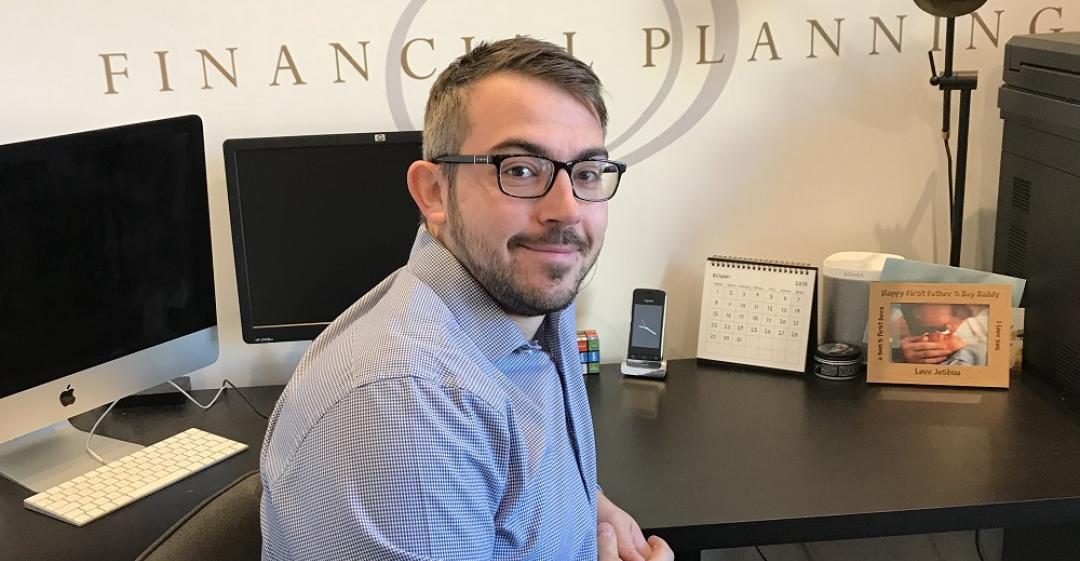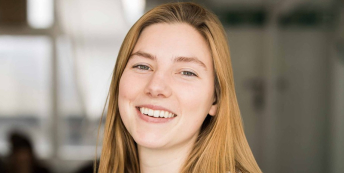“I felt very disheartened, like I'd hit a glass ceiling.”

What work were you doing previously?
I was a retail manager.
What are you doing now?
I'm a Wealth Manager with St. James's Place.
How did you feel about your work before you decided to make a change?
I felt quite trapped.
I'd always provided a good level of work, but my senior managers were concerned that my age wouldn't work with being in a more senior position.
I wanted to build something that wasn't limited by my age but by my work ethic. I wanted my success to be based on the satisfaction of my customer base.
That said, I also felt very apprehensive about the prospect of leaving.
At the time, I was working full-time, had commitments, and had a mortgage to pay. Leaving a full-time managerial role with an average salary for that sector was a daunting thought.
Why did you change?
I'd gone for an internal promotion and didn't get it.
The feedback I'd had was "You can do the job, but you're too young".
I felt very disheartened. Since I'd begun the role I'd been in, I'd consistently hit the required targets in terms of sales and profitability. It was like I'd hit a glass ceiling.
I lost all motivation and drive for the job.
Are you happy with the change?
Very happy.
I started the business two years ago. Now, I have a second adviser on board with administrative staff, with further plans to expand the team by the end of this year.
I'm extremely proud of the business. This year we've grown by 1800% as a result of business buy outs and marketing activities. Our referral numbers are strong which is fantastic. I work exceptionally hard.
I enjoy being able to talk to individuals and families about their financial plans. The team all know and have met our clients and we regularly run events where clients meet each other; I'm proud that we're trying to build a community rather than just a business.
What do you miss?
I don't miss anything about my previous role now.
Initially, I missed the teamwork and camaraderie of working within a retail environment. However, now my team has expanded, I have that teamwork ethic back.
How did you go about making the shift? And how specifically did you choose your new career?
I've always enjoyed finance, but there's a deeper motivation towards it for me too.
My family has suffered as a result of not giving their financial plans a solid foundation. When I was much younger my parents cancelled their life assurance policies; six months later my mother was diagnosed with cancer. I feel now I'm in a position to prevent things like this happening to other people.
As clichéd as it sounds, clients become regular faces that you learn about and develop close working relationships with. Clients put their trust in you to help them achieve their goals and as a result, friendships are born.
In terms of choosing the move, I completed a lot of research first.
I spoke to a number of people that were a year into the same move, to learn about their history and their learnings. I knew a number of people in the role. I was also recommended by a manager within St. James's Place.
From there I applied to join the St. James's Place Academy, which trains people to become financial advisers.
What didn’t go well? What ‘wrong turns’ did you take?
I took a lot of wrong turns to begin with.
As a financial adviser, the initial starting point for clients is family and friends, but eventually this network does end. I spent far too much time, focus and energy in dealing with the initial business / meetings, and not enough in ensuring I had a pipeline of business to come through afterwards.
I thought my business was going to grow overnight and wasn't fully prepared for the business drop after the initial months. Now, when I look back, this was obvious, but I just didn't focus on the long term enough.
Now, I have a long-term view. We've invested in our people and our infrastructure, including a move to a larger office, client management systems, new team members and staff training, to give us the capacity to grow.
I also try to manage my business and clients how I would like to be dealt with myself. We're open 365 days a year and meet clients seven days a week at any time.
How did you handle your finances to make your change possible?
I had to prepare a lot with regard to my personal finances.
I knew that I had training to complete and at least a good 12 months of business and client building to be ready for.
In the months building up to the switch, I saved enough to take me through the initial months and then relied on my personal budget to ensure that any income I received could be saved and preserved for months of lower income.
We work on profit margins. We know what profit margin we need to operate against and then work backwards from there. If we find that we are too tight and need more capital for expenses, then we work out how to increase the revenue. This allows our profit margins to stay intact. Investing in areas of the business is key (e.g. office space, IT systems and events) but the margins need to work.
My previous salary was £28,000 in the retail role. In 2019, should my business plan go to plan, my salary could be circa £120,000. However, it will be £65,000, as I've decided to invest further into the business, increase marketing activities and expand the infrastructure further to increase the pace that the Practice is growing by.
What was the most difficult thing about changing?
The initial 12 months of building the business.
It's easy to be lured into a false sense of comfort when you speak to friends and family about becoming your first clients. There's a lull period between marketing and that marketing delivering. Financial services are very personal and therefore so is your service – it all takes time to grow.
I had an exceptionally poor network to begin with. My friends were all of a similar age to me – their priority was to purchase a house, not invest for their retirement. My family, and my friends' parents, were in the position where it was too personal – they were very aware of my lack of experience. As a result of this I had to develop and carry out different marketing activities.
A very successful one was to conduct pension seminars across various organisations. This allowed us to develop goodwill and credibility with potential clients that generated business. However, it was a slow mover – it took a good nine months to start really developing good levels of business.
What do you wish you'd done differently?
I wish I'd marketed and invested in my business prior to the official starting date.
This should have happened before I'd even started the Academy training programme.
What help did you get? 
I was very well supported by my mentor.
He runs an established and successful St. James's Place Practice and we had similar backgrounds. He shared with me ideas and activities (e.g. running events for prospective clients) that had worked for him.
What resources would you recommend to others?
I would recommend undertaking some really solid and factual network research.
Learn what's the best way to meet people. Find out what your potential clients want and how they want that information?
What have you learnt in the process?
I've learnt that a large proportion of financial advisers today run 'old school' businesses: 9–5, Monday to Friday.
I've learnt to be different, to meet my clients' needs and do what's best for them.
What would you advise others to do in the same situation?
The biggest thing to ask yourself is how good are you at talking to people?
The team and infrastructure at St. James's Place can help you with the technical aspects and providing recommendations in the initial stages. You aren't going to be a genius from day one. But if you're good with people, and can give someone confidence in you, then you'll be fine.
Back yourself, work hard and you'll build a practice to be proud of.
For more information about the St. James's Place Academy, visit www.sjpacademy.co.uk.
Also, find out more about St. James's Place in our Retraining Directory.
What lessons could you take from Alexander's story to use in your own career change? Let us know in the comments below.



